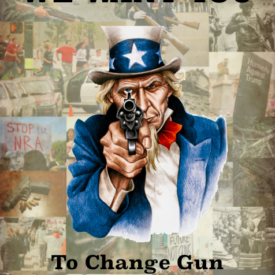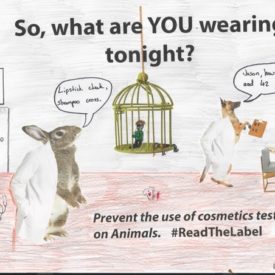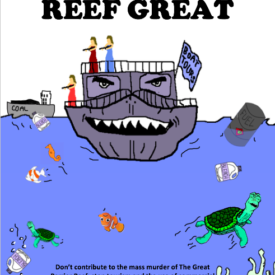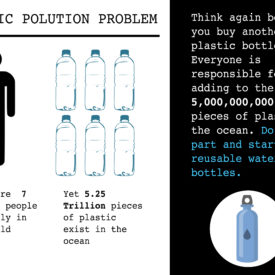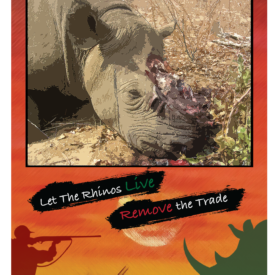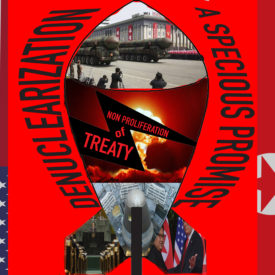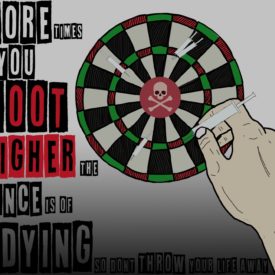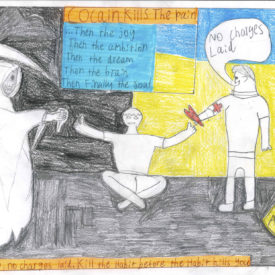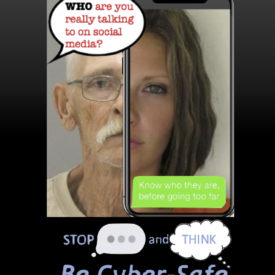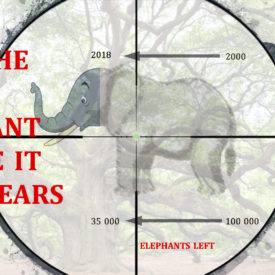Worthless
Ben Parker, Year 12
My lungs are one deep breath away from bursting, my legs are aching and sweat shoots off me like a hose. I’ve been on the run for nearly an hour now. This bush provides me with my first opportunity to replenish from the penetrating sun and pure exhaustion. Who knew a bush could actually grow in a town just out of Idaho? I don’t know why I live here, but it’s not like I really have a choice seeing as I’ve been left to fend for myself since the age of thirteen.
The piercing police sirens draw closer. They sound the same as last time. And the time before that. And the time before that. Chasing me down for no reason other than the fact that my skin is slightly darker than theirs. They want me for ‘assault’ just like they want every other non-white citizen in this stupid town for crimes they didn’t commit. To waste our time. To get us off the streets. To hurt us.
Five minutes pass. I pop my head out of the bush and then start my escape again. I sprint down Delta Avenue passing all the frail houses. A few people take the time out of their day to express their opinion towards people of my descent.
“Get out of my neighbourhood ya dirty kid!” a red-neck covered in aggressive tattoos yells.
I don’t look back. I guess I’m used to it now. I close in on the intersection like a greyhound closes in on the finish line. The traffic lights turn green and I see a police car swing around the corner. As soon as he sees me, his eyes light up. I know I am finished. He probably doesn’t even know who I am but a black guy running the streets will set off alarm bells for any white person in this sick town.
“Put ya hands where I can see them!” the policeman screams.
I do what I am told but this never really helps. He grabs me by the neck and shoves me against the rusty bonnet of his run-down Ford covered in red and blue. He then slides handcuffs on me so tight that my hands become numb and he throws me in the back of his car like a football.
At the police station, I am chucked into a holding cell. Two officers make their way over for what they call ‘interrogation’. Myself and many others know this is not the case. Torture is probably a more accurate description.
“Name?” one demands.
“Dwayne Levarok,” I reply.
“Age?”
“Nineteen.”
“Ahhh, you again. What has the loser done this time?” the other asks sarcastically.
“Just like always I’ve done nothing you pig!” I yell in his face, accidentally spitting on him. I realise I’ve just made this whole situation a whole lot worse.
“You just don’t learn, do you?”
The larger, more muscular officer steps into the cell holding his baton. He cracks his knuckles and smiles at me. It’s the evilest smile one could ever imagine. His gold tooth reflects the dimming light hanging from the ceiling, standing out from the rest of the un-brushed, charcoal looking ones. He grabs me by the throat and slams me up against the wall, knocking all the wind out of me. I feel his metallic baton smash me straight in the ribs, cracking a few in the process. I fall to the ground struggling to suck in any air.
“What do you want from me?” I cry out.
“To confess that you punched that guy earlier today,” the officer from outside the cage replies calmly as if this whole process is the right thing to do.
“But I didn’t do it!”
“Continue,” he says calmly.
Without any hesitation, the officer standing over me swings his right boot, hitting me square in the nose. He then picks me up and slams me back down, hitting my head even harder.
I slowly open my eyes, only to see a pool of blood sitting there in front of me. I look up, lightheaded and not knowing where I am.
“Glad to have you back. Now let’s get back to business.” The officer’s croaky, ugly voice rings in my head. I remember where I am now.
“So, are you ready to confess yet?”
“I didn’t do it! Just because I was in the area at the same time as someone who got hit doesn’t mean I did it!”
“Ok, so let’s say on the rare chance you didn’t do it, who did?”
“All I saw was a guy wearing a ripped singlet hit another man in the face and then run away. I then went over to help the man and when the police rocked up, they accused me of the assault, so I ran,” I blurt out.
“I don’t know who you think we are, but I’ve heard enough,” the larger officer replies, struggling to hold back laughter.
I’m so infuriated. I’m helpless just like every other minority group in this disgusting town and there is nothing I can do about it. These officers couldn’t care less what happens to me. They just want one less black man on the streets – and probably also to finish their shift so they can go to the pub.
“You know the way here. Guilty until proven innocent – and a black kid is always guilty.”


